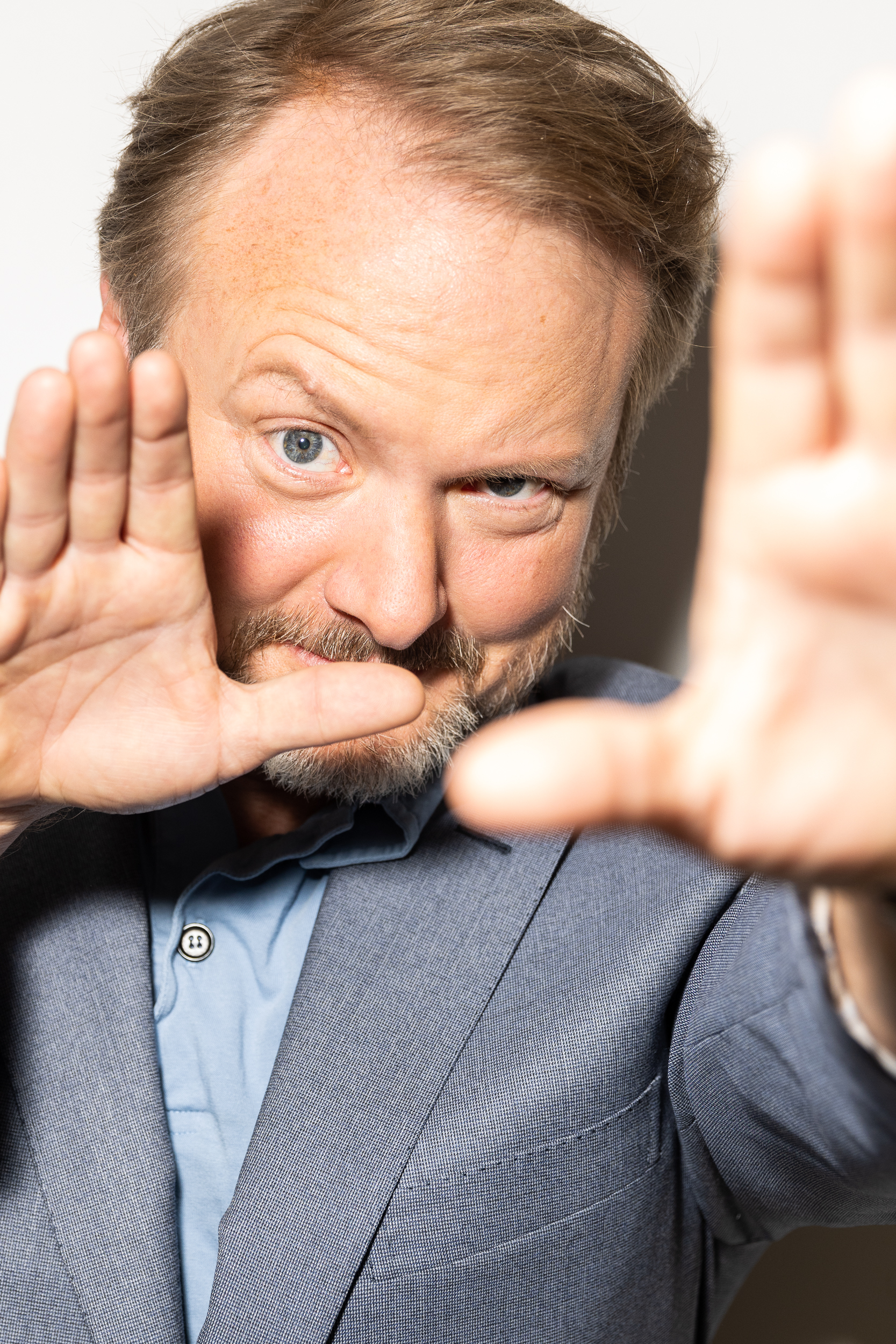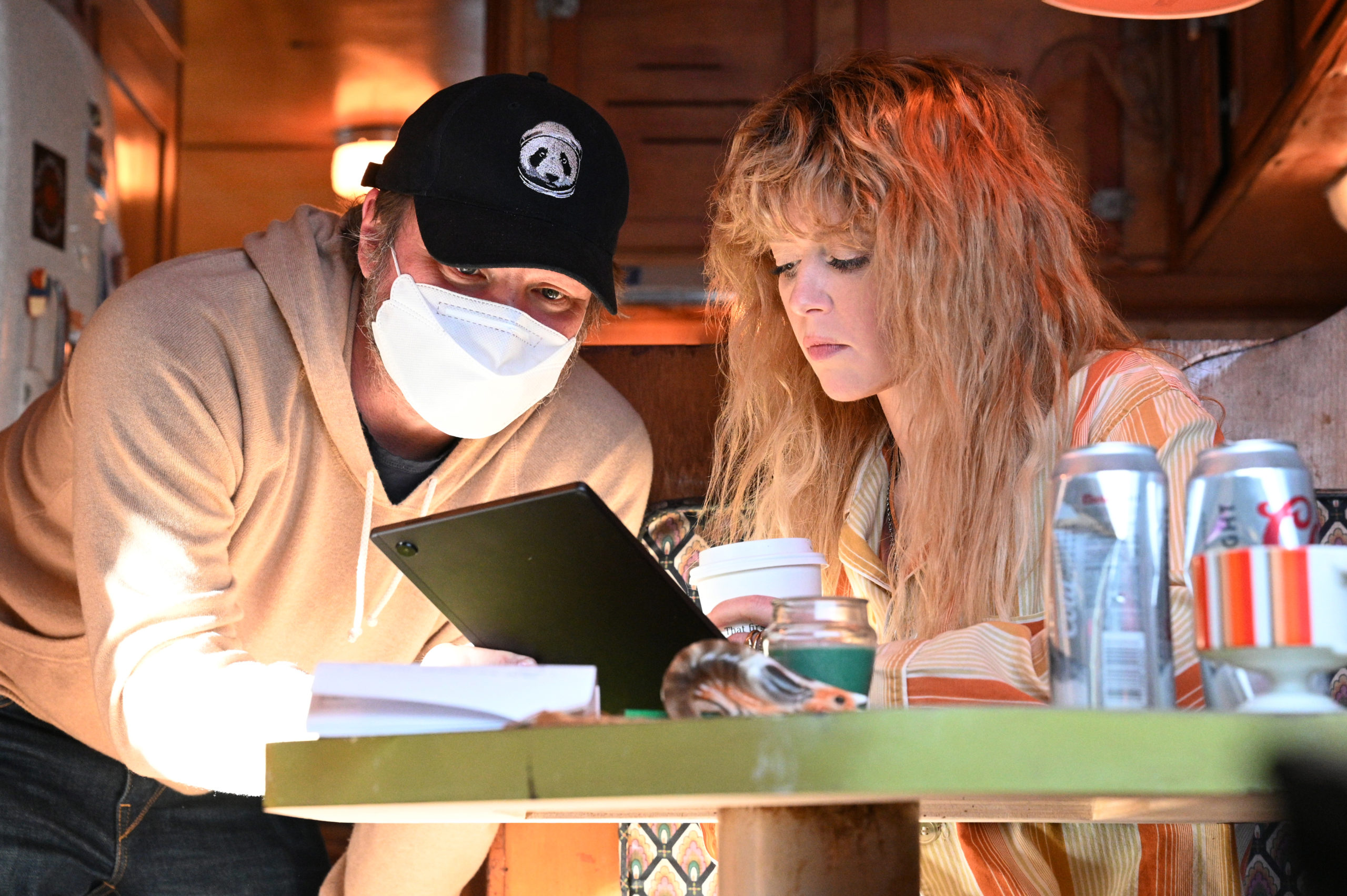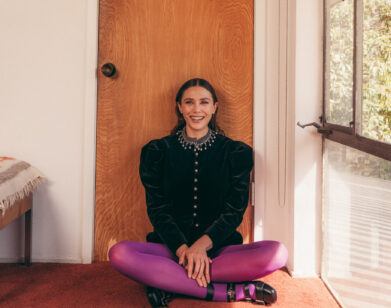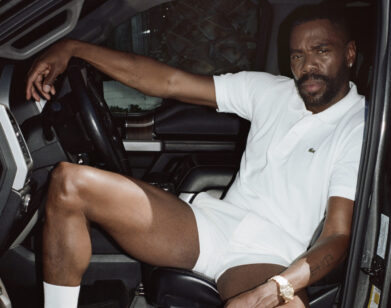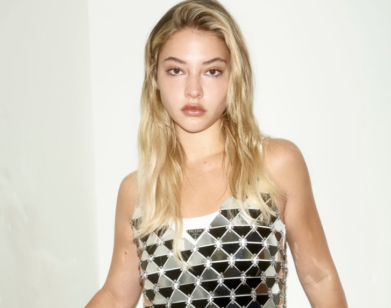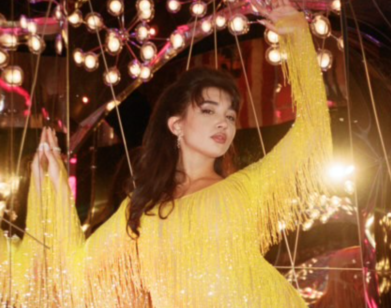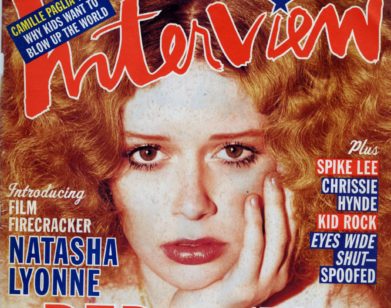IN CONVERSATION
“It’s Warhol’s Magazine!”: Rian Johnson, in Conversation with Natasha Lyonne
When Natasha Lyonne was up late on a Thursday night doing the New York Times crossword, there was one clue she knew right away. The answer to number 58 down—“Johnson who directed The Last Jedi”—was, of course, her old friend and fellow puzzle fanatic Rian Johnson. Johnson’s newest film is Glass Onion: A Knives Out Mystery, the larger-than-life follow-up to his first wildly successful whodunnit, Knives Out. Glass Onion brings together a brand new cast, including Kate Hudson, Ed Norton, Kathryn Hahn and Janelle Monae, though Daniel Craig returns as the debonair, heavily-accented detective Benoit Blanc. Also on the horizon for Johnson is the upcoming retro, quasi-procedural mystery series Poker Face, which marks the Looper director’s first foray into helming a television show. Before Glass Onion reaches streaming, Johnson called Lyonne, Poker Face star and consummate New Yorker, to shoot the shit about crosswords, Cassavetes, and casting your friends. — CAITLIN LENT
———
RIAN JOHNSON: She must be in New York. I see gothicness happening.
NATASHA LYONNE: Listen, in New York City you only wake up at like two o’clock. It’s not like LA.
JOHNSON: How you doin’? I can’t tell, are you tan? You look like you might be tan.
LYONNE: Oh, I’m in shadow.
JOHNSON: You’re in shadow, okay.
LYONNE: I am tan though. I’m Hawaii tan. Oh, Rian, I didn’t tell you yet. I have a whole new personality. I’ve abandoned the city slicker and I’m a surfer now.
JOHNSON: Thank God. I’ve been telling you for years. It’s getting old. It’s played itself out.
LYONNE: She’s dead to me now.
JOHNSON: Did you actually surf?
LYONNE: Oh yeah, I got up on waves and everything. I mean, I had to be pushed in, but that’s besides the point. Is paddling my strength? No.
JOHNSON: Did you paddle board?
LYONNE: I’m a professional surfer, so I’m not a paddle boarder. I don’t doggy paddle. I hang 10. I’m in the green room, toes to the nose. That’s who I am.
JOHNSON: I grew up in San Clemente, I tried surfing once, and I got yelled at for taking somebody else’s wave, and I never tried again.
LYONNE: I surf like a New Yorker, so I just elbow people out of the way as if they’re tourists carrying umbrellas in the rain on St. Mark’s. That’s how I feel.
JOHNSON: Your coffee, your cigarette, your phone, and just run right through?
LYONNE: Yeah, I chain smoke while I surf. And I’m so excited to reveal the real name of Poker Face: Point Break.
JOHNSON: Point Break, Poker Break.
LYONNE: Code name.
JOHNSON: Season two, we’re taking it into the ocean. Thank you for doing this, by the way.
LYONNE: Oh, it’s a thrill and an honor.
JOHNSON: Oh, my God.
LYONNE: Listen, I am what you call a Rian Johnson head. I’m a big fan, and all the bigger for knowing you and working with you, sir.
JOHNSON: Oh my God, likewise.
LYONNE: And I love the picture. I’ve seen it, and it is a real delight.
JOHNSON: I’m trying to think how early the cut was when you saw it. You saw a very early cut of it, because we saw it here, right at T-Street [Johnson’s production company].
LYONNE: Yeah, I saw it at the office with you.
JOHNSON: Yeah, yeah, yeah. I’m not saying you have to watch it again. I saw that guarded look come in your eyes, like, “He’s going to say I have to see the finished movie. Oh shit.”
LYONNE: Let me finish. I’m going to watch it blindfolded at the premiere on Monday.
JOHNSON: That’s the way it was meant to be seen.
JOHNSON: Yeah.
LYONNE: I rarely use the word delicious even when I’m eating, but here it seems relevant. It’s so delicious to see the way in which this new plot is spun. It deviates so utterly, you really don’t need to have seen [Knives Out] at all. It’s completely standalone and that’s part of the joy of it.
JOHNSON: Well with Poker Face, we were trying to get back to that idea, that notion of having a season of TV where you don’t have to even really watch them in order. Although I find now that we’re kind of figuring out the order they’re going to air in, it’s almost like sequencing an album. There is some thought and we’ve been going back and forth in terms of what would feel right in terms of the progression. In that way, it’s good. As opposed to, I mean, Russian Doll, can you imagine somebody watching the second season of Russian Doll who hadn’t seen the first season?
LYONNE: Oh, I think actually maybe it would be enjoyable to watch the second without the first. It’s almost like season two is actually an origin story for season one.
JOHNSON: You’re right.
LYONNE: I wonder if it functions better backwards.
JOHNSON: Yeah, you’re right.
LYONNE: The events of season two precede the events of season one, in a way.
JOHNSON: If you got to the end of eight seasons of Russian Doll and then revealed it was meant to be watched backwards, that would be kind of the ultimate life’s work hat trick.
LYONNE: That would be gangster. And from your lips to god’s little tiny, adorable face. Turns out god looks exactly like Betty Boop.
JOHNSON: Yes.
LYONNE: When did this love of mysteries happen in your life? I know that you rewatched all of Columbo in the pandemic, but of course I’m sure you’d seen it many times before. And certainly Knives Out is a pre-COVID picture. When your genius wife writes about this era of Hollywood, they’ll refer to it as a “pre-COVID picture.”
JOHNSON: “Pre-COVID picture.” Yeah.
LYONNE: Pre-code and pre-COVID. So when did that love first come to you?
JOHNSON: Well, as I look over here, there’s a book. So my parents, or maybe it was my grandparents house, had this book on their shelf. This is an Agatha Christie paperback of her novel Curtain. And it’s the Pocket Books edition. And it’s got this kind of creepy painting of Poirot set off to the side on an entirely black cover and the font is creepy. We actually copied this font for the Knives Out title treatment.
LYONNE: Oh!
JOHNSON: So I was a kid and I saw this on the shelf, it just looked terrifying. And so I picked it up and read it and that was how I first got into Agatha Christie. And then also the movies that were being made back then, like Death on the Nile and Evil Under the Sun. Those were the type of [movies], whole family, comes back from the local video store and gathers around the TV to watch it. And I was a little kid standing in the back feeling like everyone had forgotten that I should be going to bed. And that feeling of watching something really adult.
LYONNE: I certainly agree with you that part of the joy of Columbo, and I know for both of us obviously, I mean who doesn’t love Cassavetes? Only some schmuck that we don’t know, hopefully.
JOHNSON: Schmo.
LYONNE: Some schmo. But I mean, it’s such a joy to see.
JOHNSON: Right.
LYONNE: For Glass Onion, did you have any of the final cast members in mind when you were writing?
JOHNSON: No. That way leads to heartbreak. Unless they’re really good friends and you know you could get them. Like I bet you had Chloë [Sevigny] in mind, right?
LYONNE: Yeah, as soon as that character came into existence. Although in the first season of Russian Doll, I don’t think we knew that we were going to go there.
JOHNSON: Right, right.
LYONNE: Weirdly, in the original pitch materials for Russian Doll, the second season was always going to involve the mother, but the first, not so much. And of course, Chloë only plays for one episode in the first season and the sort of flashback penultimate episode of season one. At the time it was going to be a sort of Cookie Mueller figure based on the Tompkins Square Park riots and gentrifying East Village. I think it was so vulnerable that it was like, “Who would I feel safe with?”
JOHNSON: Oh my God, we’re mixing her episode this afternoon. It’s so good. Yeah, I’ve only done that a couple of times. With this one obviously I knew Daniel [Craig], and then when I wrote the Poker Face pilot, you, and that’s kind of it. It’s a double-edged sword because you feel the danger is that you’ll write with your vision of that person from real life. You have a voice in your head. I don’t know. It cuts both ways. I wonder if that can interfere with creating, though I think overall it’s probably a good thing to have a voice in your head while you’re writing.
LYONNE: I remember when you sent me the pilot, it was like “Holy shit.” I always feel like it’s a very loving gesture in a world that’s so cold and weird and estranged because of robots in our hands all day. Whether that’s me writing for Chloë or you writing for me, it’s really a way of saying, “No man, I really like you. I’m into your whole trip in a very real way. So much so that look what I typed up.”
JOHNSON: It’s like buying the ring.
LYONNE: You can’t put that genie back in the bottle.
JOHNSON: Yeah, I know.
LYONNE: Person is my pal. For real.
JOHNSON: I definitely got the sense that you were slightly surprised when I actually turned up with a script.
LYONNE: I know. I was.
JOHNSON: We were just friends hanging out, bullshitting about how it would be fun to do this, it’d be fun to do that.
LYONNE: I thought we were eating french fries. No. But I was like, “Oh, I guess this is how we hang out.” But you were dead serious. How did you and Daniel settle on the accent for Benoit Blanc?
JOHNSON: That was a real process. I didn’t want to freak out the people who were putting the money up for the movie. I used eight adjectives that all meant “slight” to describe the accent. I was like, “It’s the most minuscule, slight lilting, barely there, you’ll hardly even notice it, Southern accent in the world.” And then Daniel just dove into it and we started sending each other references. I think we started thinking, “Well, what does he sound like? Is he Faulkner?” And then we actually listened to recordings of Faulkner talking and we’re like, “Nope, not like Faulkner.” And then I forget if I or Daniel landed on Shelby Foote, the historian who is in a bunch of Ken Burns’ Civil War documentaries. Then Daniel just went to town with it. But it was weird with the second movie, he had to start from scratch because the danger for him, kind of like we’re talking about with writing, the danger for him was imitation, was that he would just be doing a impression of his accent in the first movie and be a photocopy of a photocopy like that Michael Keaton movie about the clones. And that leads nowhere good.
LYONNE: You guys certainly avoided that impeccably and it feels like a wholly original performance. If anything, it’s a deepening.
JOHNSON: Thank you. How did you land on your heavy Polish accent that you went with for Poker Face? Because it was quite a choice when you committed to it.
LYONNE: Well, that’s how you make an iconic, Angela Lansbury Murder She Wrote type of a character. We settled on Polish and it was really attributed to my love of Chloë, who is Polish. [Laughs] But no, for anybody reading this and deeply disturbed—
JOHNSON: We are joking. We are joking.
LYONNE: Although I am deeply Eastern European bloc by descent, I speak American. Whatever my version of that is.
JOHNSON: Well, there was a process though, I think for both of us, figuring out this character for you. There wasn’t an accent. It was a real process of finding out how this person would be different from stuff that you played before. And maybe, I guess there always is, but with this it felt a little more because because we were setting up a character for hopefully an ongoing series, the stakes felt a little higher. You were committing to what this person is going to be very early.
LYONNE: Yeah, I remember we spent a lot of time, I mean similar to what you’re talking about with Daniel, this not wanting to be a facsimile and each character. I always think doing a play is the clearest version of that. Because I feel like the first time you do a read through of a play, you’re like, “Ah, cracked it. It’s perfect.” And then you spend months ripping it apart and feeling like every line and every choice is broken. And then somehow, in doing all that work, you’re sort of restored to something very similar to a first instinct, but it feels backed by something that you can really lean on for eight shows a week. And it’s not just luck or arbitrary.
JOHNSON: Interesting.
LYONNE: It’s something that you should be able to call on and command, regardless of whether you’re feeling it or not, you should have enough roots and tethers in why this person operates the way they do, that you can do it under any conditions, meaning we’re in a rush or the other actor doesn’t know their lines, or whatever it is, such that you are locked and loaded, especially when you’re the rock, like Daniel in Glass Onion or me in Poker Face or Russian Doll. You’ve got to really know. And the big thing I think we landed on was that Charlie, unlike Nadia, was not a city slicker. So she was somebody who ultimately had the sunshine on her back and a different, more laissez-faire sort of Big Lebowski dude energy than Nadia, who’s a little bit more of a Lou Reed figure. It’s a different sort of a feeling altogether. So I know whenever I was in a bind on Poker Face, if you weren’t directing or something, I’d lean on a smile instead of a sneer. She reacts in kindness to things, and she’s a curious person who loves a puzzle, as opposed to, “Let me tilt my head down and chain smoke my way around the corner.”
JOHNSON: It’s interesting the thing you’re saying about theater. In theater, if you’re doing eight shows a week, you’re not going to feel it every time. It’s going to be impossible to get yourself in that magic place where everything feels right for every single show. But you can call it up even if you’re not there that day.
LYONNE: Well, it is a craft. I love seeing you on set. You really get down on your back, or on your belly, and you have a lens to your eyeball and you’re really in there and in that way that it’s sort when craft and technicality and specificity of vision also meets improvisation, because you’ve got that practice under your belt where it gives you the freedom to create on instinct in real time.
JOHNSON: I’m really excited about it, I know we keep talking about—well, I know we’re supposed to be talking. We’re just supposed to be talking.
LYONNE: It’s Andy Warhol’s magazine! He knows the vibe. Even though he doesn’t do interviews anymore.
JOHNSON: He let it go to hell. I was going to talk a little bit about the episode that you directed and that you wrote and directed. You wrote it with Alice Ju and directed it, and it’s so fucking good. It’s got a specific genre to it, like a movie monster magic behind the scenes thing. It was weird for me, though, because I wasn’t on set when you were directing. So I literally just got to see the end product. I would’ve loved to be a fly on the wall for that.
LYONNE: There is nothing more fun for my money than directing. It really makes me happy, in a very clean way, like nothing else. Just because it’s such an awake activity. It’s a very alert, collaborative thing, where it’s like you really better show up for this one. There’s a lot of things where the mind plays tricks on you, that I could probably do this one sort of emotionally in a remote way, but it’s a best self that emerges when you have to show up for other people as opposed to showing up for one’s self. And it’s much like the alertness necessary for doing a crossword puzzle in record time. So maybe we should talk a little bit about our shared love of Duotrigordle and the crossword.
JOHNSON: I got Shauna, Edward Norton’s wife, hooked on Duotrigordle and now she’s got her son Atlas into it.
LYONNE: I love that.
JOHNSON: I’m spreading what you started in me. I haven’t done today yet. Have you done the crossword today? Have you done Tuesday’s?
LYONNE: I think I did it last night at around four in the morning.
JOHNSON: I’ve still got to finish it.
LYONNE: You were in the crossword not too long ago.
JOHNSON: They had Knives Out as a clue on Saturday. That was kind of cool.
LYONNE: Congratulations. I screen grabbed it but didn’t send it to you.
JOHNSON: Yeah, that’s all right. As long as you have it, I’m happy. That’s all I want is for you to have it on your phone.
LYONNE: All right, well let’s wrap up here. I could really—
JOHNSON: Go back to bed?
LYONNE: No, I actually have to go record the Simpsons.
JOHNSON: Are you going to do Simpsons?
LYONNE: Yeah. I’m Krusty the Clown’s daughter.
JOHNSON: Oh my God.
LYONNE: That’s the day ahead of me. I have a couple questions I didn’t ask you, but—
JOHNSON: Hit me. Speed round.
LYONNE: Speed round?
JOHNSON: Yeah, let’s do it.
LYONNE: Have you yourself, Rian, ever planned or participated in a murder mystery party?
JOHNSON: We did while we were shooting Glass Onion, because we were in Belgrade during the Delta surge. The numbers were really bad, so we’re locked down in our hotel with the whole cast, and we would rent out the roof on weekends to blow off steam and go up there and play Mafia with the whole cast. We’d all get really drunk and order a bunch of sushi and play Mafia.
LYONNE: The best.
JOHNSON: It’s great. It was really good.
LYONNE: Do you feel like it’s mature and responsible to play quite so much Pokemon on set?
JOHNSON: It’s part of my process. I thought I was being so sneaky and I was hiding it when I was playing. I guess I was pretty brazen about it.
LYONNE: No, because you were killing Pokemon.
JOHNSON: We didn’t kill them.
LYONNE: Killing them, or whatever the fuck—
JOHNSON: You don’t kill them. You capture them and force them to fight each other. Very humane.
LYONNE: The ether, it’s so thin. And now I’m seeing “pokey men.” I’m very susceptible.
JOHNSON: “Pokey men?”
LYONNE: Lasting damage. There’s “pokey men” everywhere.
JOHNSON: Sam Fuller would carry a gun on set. I play Pokemon Go. We all have our quirks. You’re going to have to roll with it.
LYONNE: Well, whatever you’re doing, it’s working. Never change.
JOHNSON: Thank you. Thank you so much for doing this. Seriously, I appreciate that so much.
LYONNE: Thank you.

